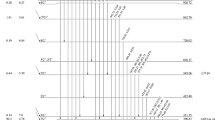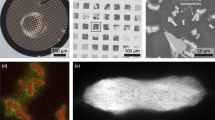Abstract
SAMARIUM-146 was discovered in 1953 by Seaborg and Dunlavey, who produced the nuclide by an intense bombardment of neodymium with α-particles1. They reported that it emitted α-particles of 2.55-MeV. energy and decayed with an α-half-life of approximately 5 × 107 years.
This is a preview of subscription content, access via your institution
Access options
Subscribe to this journal
Receive 51 print issues and online access
$199.00 per year
only $3.90 per issue
Buy this article
- Purchase on Springer Link
- Instant access to full article PDF
Prices may be subject to local taxes which are calculated during checkout
Similar content being viewed by others
References
Dunlavey, D. C., and Seaborg, G. T., Phys. Rev., 92, 206 (1953).
Macfarlane, R. D., “Natural Alpha Radioactivity in Medium-Heavy Elements” (thesis), Department of Chemistry, Carnegie Institute of Technology, NYO-7687 (May 1959).
Macfarlane, R. D., and Kohman, T. P., “Natural Alpha Radioactivity in Medium-Heavy Elements” (in the press).
Vorob'ev, A. A., Komar, A. P., Korolev, V. A., and Slogakin, G. E., J. Exp. Theor. Phys. (U.S.S.R.), 37, 546 (1959); Soviet Physics-JETP, 37, 386 (1960).
Collins, T. L., Rourke, F. M., and White, F. A., Phys. Rev., 105, 196 (1957).
Author information
Authors and Affiliations
Rights and permissions
About this article
Cite this article
MACFARLANE, R. Natural Occurrence of Samarium-146. Nature 188, 1180–1181 (1960). https://doi.org/10.1038/1881180a0
Issue Date:
DOI: https://doi.org/10.1038/1881180a0
Comments
By submitting a comment you agree to abide by our Terms and Community Guidelines. If you find something abusive or that does not comply with our terms or guidelines please flag it as inappropriate.



